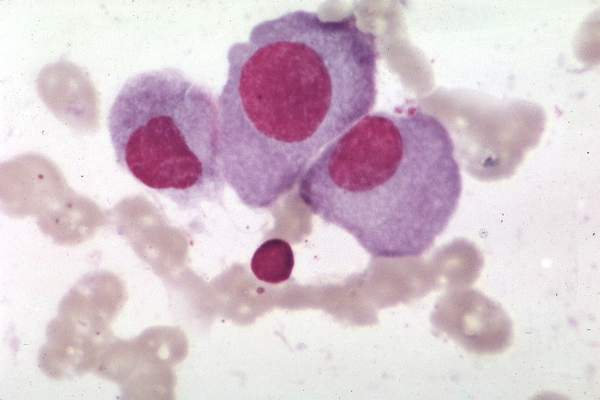FROM LEUKEMIA
The emerging role for immunotherapies as an essential component of multiple myeloma therapy is examined in a review article in Leukemia by Cyrille Touzeau, MD, and his colleagues.
The reviewers detail research examining a string of monoclonal antibodies that fell short in earlier evaluations. They focus on the two approved agents that target CD38 (daratumumab) and SLAMF7 (elotuzumab) and have succeeded in combination therapies for patients with relapsed myeloma. These two antibodies, and other immunotherapy possibilities in the pipeline, are expected to have a strong impact on treatment modalities and outcome in patients with multiple myeloma, including transplant eligible and elderly patients, Dr. Touzeau, of the service d’hématologie clinique, Nantes, France, and his fellow researchers wrote.
The utilities of daratumumab and elotuzumab, which are approved for use in combination therapies for patients with relapsed/recalcitrant disease, are now being examined in trials for initial treatment of myeloma.
In two phase III randomized studies, ELO 1 ( NCT01891643 ) and ELOQUENT 1 ( NCT01335399 ), previously untreated myeloma patients are receiving lenalidomide/dexamethasone with or without elotuzumab.
In another ongoing trial, elotuzumab is being evaluated in combination with the anti-KIR antibody lirilumab and the anti-CD137 antibody urelumab ( NCT02252263 ). Elotuzumab also is being studied in combination with lenalidomide as maintenance after high-dose therapy ( NCT02420860 ).
Additionally, elotuzumab in combination with pomalidomide-dexamethasone is being examined for relapsed myeloma in an ongoing phase II randomized trial ( NCT02654132 ). SLAMF7 is also being evaluated as a target for immunoconjugate therapy, with an ongoing trial of an auristatin E conjugate (ABBV-838) in patients with relapsed or refractory disease ( NCT02462525 ), the reviewers note.
Daratumumab is being examined in combination with venous thromboembolic disease as induction therapy and for its role as maintenance after high-dose therapy, among previously untreated transplant-eligible myeloma patients in the phase III randomized Cassiopeia study ( NCT02541383 ).
In patients not eligible for transplant, the phase III randomized trial, MAIA, is evaluating the addition of daratumumab to lenalidomide-dexamethasone ( NCT02252172 ). In high-risk smoldering myeloma, daratumumab is being evaluated in the phase III randomized CENTAURUS trial ( NCT02316106 ). PAVO is a phase 1b study of the subcutaneous administration of daratumumab ( NCT02519452 ). Preliminary results determined that the fixed subcutaneous dose of 1800 mg was consistent with the 16 mg/kg IV dose in terms of pharmacokinetics.
Dr. Touzeau declared no conflicts of interest. His coauthors participate in advisory boards and receive honoraria from several drug makers including the makers of immunotherapies.
On Twitter @maryjodales





